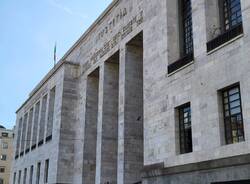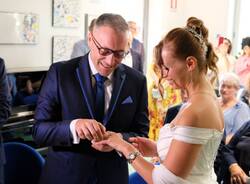Ispra’s recipe for “post-Kyoto”
The European Union is taking part in the Copenhagen "Earth Summit". The position of the commission is based on scientific advice provided by the JRC, where future climate scenarios are studied. Are we just going to watch? "We must all do something."
Over the next few days, the “lords” of the Earth are going to decide how to save the planet. Copenhagen is the meeting point, but before speaking, they are going to ask Ispra for “help”. In fact, every European government is going to consult the JRC scientists to understand what effects their choices might have.
Scientists like Frank Raes, the director of the JRC Climate Change Unit, have always provided scientific support for the European Union’s decisions, and at this crucial stage, they will do it again. Furthermore, they will have their own delegation present in Copenhagen to answer all of the decision-makers’ questions on the best way to proceed. This is why we dropped into Raes’ office at the JRC Ispra, just a few hours before he left for Denmark, to understand, beforehand, what is going to happen in Copenhagen from December 7 to December 18.
What do you expect from the Copenhagen meeting? Why is it so important for all of our lives?
"The Kyoto Protocol will expire in 2012, but we still have to find an agreement for the years to come. According to Kyoto, greenhouse gas emissions must fall by 8% with respect to 1990, by 2012, but this is not enough. We must achieve a reduction of 20% in 2020, and of 50% in
Some of Obama’s statements suggested that the summit would be "light", with no concrete decisions until we know what’s happening with the financial crisis. Is it right?
"This agreement will have two stages: at the moment, we hope for a political agreement that forces countries to create a legal, binding, agreement within six months or at least by the end of next year."
When it comes to climate changes, there’s a feeling of urgency: Isn’t there a danger that we are wasting too much time?
"The governments have chosen a target limit: the Earth’s temperature must not increase by more than two degrees with respect to the industrial period. In some respects, this is an arbitrary choice, as some islands will be damaged, even with a one-degree increase. It is a start, though. Now, to avoid a two-degree increase, total global emissions must fall, by 2020: this is certain, it’s what the scientific models tell us. This is why we have to start working now: once the Kyoto protocol expires, we won’t have anything concrete, so we have three years to set up legislation. It’s not long; it took us eight years to set up Kyoto."
Is there a danger of reaching a point of no return?
"It’s essential to prevent a two-degree temperature rise. If it rose more, mechanisms would start that would be difficult to control. If the ice caps started melting, we certainly wouldn’t be able to restore them in a year … The disasters in Messina and Istanbul, this summer, are the signs of change. We now know what role Man has in climate change."
What is the role of the JRC Ispra in the decisions that will be taken in Copenhagen? "We are part of the European Commission and we have provided the necessary tools to establish the EU’s position at the decision-makers’ table. The JRC always give scientific support to these decisions. We’ve already been working on the European bill for two years.”
What will the EU position be?
"The EU has already decided unilaterally to reduce emissions by 20% with respect to 1990, by 2020. Depending on the Copenhagen agreements, we might even reach 30%.”
What limits does science say are necessary?
"We must achieve a 50% reduction by 2050; this means the rich countries have to reduce their emissions by at least 80% with respect to 1990. It’s an ambitious result."
It is ambitious. But is it feasible?
“Good won’t be enough, we’ll also need the support of technology. We already have interesting energy technologies. But we need to create a market that promotes them. Furthermore, we need to invent a new concept of economics, that is, the so-called green economics. We need to produce and consume things differently. I’m not saying we should return to the Middle Ages, but we must stop being wasteful.”
How important is it to involve all countries throughout the world?
"The difficulty of the negotiations in Copenhagen lies in the relationship between rich and poor countries. If climate change occurs today, it depends primarily on the rich countries, to which the poor countries delegate many responsibilities. We’ve managed the world for 200 years, and we’ve enjoyed the benefits, now the poor countries are calling us up on our responsibilities, before they act."
Copenhagen is also the time to assess Kyoto. How did Europe and Italy do?
"The data is clear. Europe is going to achieve the Kyoto targets, but this is thanks to some particularly well-behaved countries, such as the United Kingdom and Germany. In these countries, there have been policies targeted at reducing emissions. Unfortunately, Italy has not made any improvements. It is true that we’ve been using methane for a long time, and so, the starting point was one of an efficient and clean economy. But we have seen emissions rise, and this is unwanted. We are behind in developing alternative energies: if we installed windmills, we would have to buy them somewhere else."
What can people do to help?
"We can all start doing something immediately, stopping the wastage of energy. I’m almost ashamed to admit that I alone I produce 17 tonnes of CO2 per year. An average Italian produces 10 t, an average American produces 20 t. One third of the CO2 produced per person comes from cars, one third from the household, and the remainder comes from wastage related to consumption. In order to stabilise the climate, we have to reach 2 tonnes per year, by 2050."
As consumers, is it possible for us to achieve these results alone?
"Our behaviour as customers can also influence the production system: no one is forcing us to buy big heavy cars, we can tell the market that we want light, less polluting cars. But, in fact, only 5-10% of the population do this, the others … just live. That’s why agreements and binding laws are necessary. Here, at the JRC, we have a big database on emissions, which, in collaboration with Google Earth, we are going to open up to the public at Copenhagen; this will enable everyone to monitor the situation and to become aware of the problem."
With the closing down of companies, the economic crisis has paradoxically reduced gas emissions. What lessons we should learn at this stage of the recovery?
"People are saving energy, some companies are closing down, so the production decrease has led to reduced emissions. Now, as we come out of the crisis, we must learn to be more efficient, and not to waste. New technologies, like hybrid cars, can help us to do this. We should seize this opportunity to set up a new economy. There are new jobs: building windmills, solar panels, planting forests … There are new opportunities. It is no coincidence that, in many countries, investments against the crisis are already going to those who produce in a different way. Some European countries have shown that the growth in GDP combines very well with reduced emissions."
La community di VareseNews
Loro ne fanno già parte
Ultimi commenti
PaoloFilterfree su La presidenza come feed
Viacolvento su Gli aumenti nelle rette e il rischio-defezioni alla Fondazione Scuole Materne di Gallarate
Felice su Sosta selvaggia sulla Superstrada di Malpensa, 61 sanzioni per gli "aspettoni"
Felice su «Ai ragazzi servono spazi, costruiamoli insieme», a Varese 400 persone sfidano il freddo alla Marcia per la pace
BarbaraFede su Sosta selvaggia sulla Superstrada di Malpensa, 61 sanzioni per gli "aspettoni"
BarbaraFede su Sosta selvaggia sulla Superstrada di Malpensa, 61 sanzioni per gli "aspettoni"
















Accedi o registrati per commentare questo articolo.
L'email è richiesta ma non verrà mostrata ai visitatori. Il contenuto di questo commento esprime il pensiero dell'autore e non rappresenta la linea editoriale di VareseNews.it, che rimane autonoma e indipendente. I messaggi inclusi nei commenti non sono testi giornalistici, ma post inviati dai singoli lettori che possono essere automaticamente pubblicati senza filtro preventivo. I commenti che includano uno o più link a siti esterni verranno rimossi in automatico dal sistema.